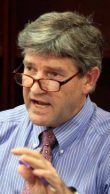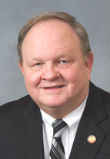RALEIGH — The University of North Carolina at Chapel Hill chose an interim director for its new environmental policy center amid heightened concerns both on and off campus about the potential for political interference in the center’s work.
The university announced Friday that Brad Ives, the university’s chief sustainability officer and associate vice chancellor for campus enterprises, will temporarily lead what’s being called the North Carolina Policy Collaboratory.
Supporter Spotlight

Ives said Tuesday that he anticipates the first staff to be hired within two months. One will coordinate research and the other will head community engagement.
The university also announced last week that Provost James Dean would head up a faculty advisory committee to provide direction and input for the new center.
Some faculty members on the Chapel Hill campus are worried that the collaboratory is being set up outside the normal process for establishing research entities at the university. The North Carolina General Assembly included the center in the state budget that it passed in July.
Ives said Tuesday that Dean would begin contacting faculty members identified as potential advisory board members in the next few days.
Much of the controversy has centered around as yet unconfirmed reports that Jeff Warren, science adviser to state Senate leader Phil Berger, R-Rockingham, was being considered for a key role at the collaboratory.
Supporter Spotlight
Berger’s office has not returned repeated inquiries for comment, but a report on the center in the News & Observer of Raleigh further raised concerns after Berger defended the legislative directive and said he believes state universities are shutting out conservative voices.
Steve Leonard, a UNC-CH political science professor who recently chaired the UNC system’s Faculty Assembly, said the questions go much deeper than who might work at the center. The sudden push by the legislature into university research surprised even those keeping a close eye on the budget, Leonard said in a recent interview.

In addition to the potential for “partisan politicization” there is a strong concern for what appears to be an effort to sidestep safeguards, Leonard said. The new center, which will be organized under Chapel Hill’s Business and Finance office rather than the school’s academic wing, wasn’t established under the same process as other research centers.
By directly setting up a new policy center rather than working with university and the UNC Board of Governors to create it, the legislature has already put the work of the center in question, Leonard said.
“What this is going to do is that no matter how good the science is coming out of this center, the fact that it has been tainted with a problematic process and set of procedures means that it’s going to make it that much harder even for good science to be accepted.”
Given how the center was created, it will be difficult to avoid a future controversy over the results of its research, he noted.
“When you circumvent or undermine good process and good procedures, the likelihood of good science being done or people at least not questioning the integrity of what’s done is radically diminished,” Leonard said.
University officials and legislators who backed the plan have pushed back on the idea that the collaboratory’s work would be influenced by the General Assembly.
The effort isn’t aimed at shaping science, but trying to get legislators additional information, said Sen. Harry Brown, R-Onslow. “The more expertise you can get the better.”
In Friday’s announcements, UNC-Chapel Hill Chancellor Carol Folt said the mission of the collaboratory is “to support academic-influenced, scientific research to help create solutions for natural resources challenges that are important to the citizens of North Carolina.”

The faculty advisory committee headed by Dean will provide input on projects and grants, Folt said. Dean met last week with the Executive Committee of the Faculty Council to go over how the center’s mission and structure will be developed.
In all, the Senate-sponsored budget provisions could send the collaboratory up to $8 million in funding in its first year. An additional budget provision, directs Ives’ office, to spend $500,000 annually for the next four years on a detailed set of studies and policy review on state nutrient management strategies with a special focus on the Falls and Jordan Lake watersheds near Raleigh.
Brown said the provision in the budget on nutrient studies on Jordan and Falls lakes are aimed at settling a decades long dispute between Triad and Triangle area legislators. “There always been a battle between Guilford and Alamance counties and Durham and Wake counties on how to manage this water issue.”
Rep. Chuck McGrady, R-Henderson, said he is skeptical that new studies on the issues with the lakes will net different results, but he is hopeful for now that Chapel Hill officials can keep the collaboratory independent of the politics surrounding the issues it studies.
“I’ve spoken to Chancellor Folt and Vice-Chancellor Brad Ives about that,” McGrady said. “They have assured me that the collaboratory will be consistent with how academic studies are approach so there will not be any political influence.”
McGrady said while he trusts Folt and Ives, he’s also taking a wait-and-see approach as the new center is set up. “The proof is in the pudding,” he said.
Leonard said more transparency at this point is essential. “The two questions I’m primarily interested in and I know that the staff and governance bodies across the system and especially in Chapel Hill ought to be interested in are who thought they had the authority to demand this sort of thing and push it through the legislature and how much did the administration in Chapel Hill cooperate on this and under what conditions,” he said.
Coastal Review Online and other new organizations have filed public records requests with UNC-Chapel Hill for documents relating to the collaboratory, but have not received a response.
Faculty Involvement?
Bruce Cairns, chair of the UNC-Chapel Hill Faculty Council, said he’s received numerous inquiries from faculty members asking how the new center will interact with the faculty.
“There continues to be a great interest in this,” Cairns said.
Discussions have started with university researchers in the related fields of study, he said, as well as how the faculty can participate in the process. Cairns said he expects that as a public university the process would be open and transparent.
Complicating the process, Cairns said, was the lack of specifics on structure and duties in the legislative provision.
“Most of the time these programs come from the faculty,” he said. “It’s different when the General Assembly is the one creating it.”
Cairn said that the Faculty Council would likely schedule a review of the idea once it takes more definite shape.







